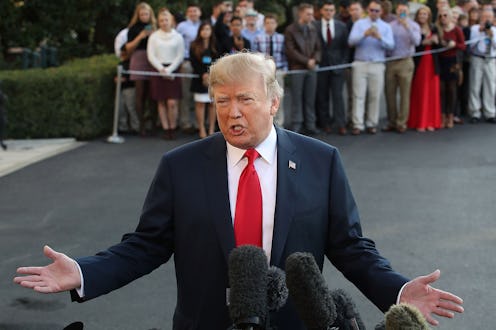News
Here's How You Can Make Sure Facebook Ads Never Poison An Election Again

Last month, the Federal Election Commission announced that it's seeking public comment on whether it should institute a rule requiring online political ads to disclose who paid for them. Now, a coalition of organizations is working to make sure the public takes advantage of the FEC's public comment period, especially in light of the revelation that Russian officials paid hundreds of thousands of dollars for online ads to influence the election. If successful, the commission would require ads on Facebook and Google to reveal their sources so that what happened during the 2016 election won't ever happen again.
The campaign was conceived by a coalition of organizations to motivate their members to participate in the FEC's public comment period. And the wide range of organizations involved should tell you something about the magnitude of the issue. Included among them are progressive organizations like MoveOn and CREDO; nonpartisan groups dedicated to cleaning up American democracy like Open Secrets and Free Speech For People; and groups formed specifically in response to various aspects of the Trump administration, like Stand Up America and March for Truth. There are altogether 15 organizations, each of which is offering its own comment and then asking its members or followers to do the same.
Both the campaign and the FEC's request for public input on the matter come after it was revealed that a Russian troll farm spent $100,000 on Facebook ads that reached up to 10 million people — none of whom knew where the ads were were coming from. If the FEC does end up implementing this new rule, then disclaimer notices on internet ads could become as ubiquitous as they are on the political ads you see on TV, where there's a disclosure at the end telling viewers who paid for it.
Sean Eldridge, the president of Stand Up America, submitted a statement to the FEC that stressed future election outcomes.
"It's been a year since Russia’s attack on our democracy, and Congress has done nothing to protect our elections," Eldridge wrote. "So the FEC can — and must — act to provide American voters with the transparency we deserve by requiring online ad disclosure, just as they do for television and radio ads."
Disclosing the sources for online political ads could be important for several reasons, and it could have played a significant role in the 2016 campaign. Brendan Fischer, the director of the Campaign Legal Council's federal and FEC reform programs, tells Bustle that the issue is better informing the populace about where online political ads are coming from.
“Currently anytime you see a political newspaper ad, you see a box on the bottom saying ‘paid for by Donald Trump, Donald Trump for president,’ or ‘paid for by the NRA, not authorized by any candidate,'" Fischer says. "Same with TV, at the end of any broadcast, political ad, you’ve got the disclaimer both on the screen, and usually spoken."
For online ads, it's not explicitly clear whether disclaimers are required — and that's mostly the FEC's fault, according to Fisher. "That vulnerability, or that gap in transparency requirements, was exploited by Russia in the 2016 elections," he says.
In other words, if the 10 million people who saw the Russian-bought Facebook ads had known who paid for them, their messages could have been much less effective. For one thing, it's illegal for foreign entities to buy American political advertising; while it's difficult to draw the line between exactly what counts as advertising and what doesn't in some cases, having to fully disclose where the advertising was coming from could have prompted Facebook to turn down the sale and could have made their messaging essentially useless. The strength of these ads was that they were modeled to look like American grassroots campaigns — even though they actually came from troll farms in Russia.
Besides pushing the FEC to implement the new rules, your public comments could also have another effect — influencing tech giants like Facebook, Twitter, and Google to be a bit more discriminating about who they take their advertising money from. Facebook has long pushed back against regulations regarding political advertising and where the money comes from, a stance they've now stepped away from in the wake of these revelations.
Fischer acknowledges that even if the new rules were in effect in 2016, it would not have necessarily changed the outcome, or completely curtailed the flow of Russian-backed political ads on Facebook. But they could have helped provide a path ― a "bread crumb," as Fischer calls it ― to make people more broadly aware of the interference effort.
"Voters, and journalists, and watchdog groups, maybe even law enforcement, might have been able to put these pieces together sooner," Fischer says. "The public never really learned until after the election that there were thousands of ads circulating on Facebook that were purchased by Russia."
For better or for worse, social media is now an important part of our lives, both personal and political. By forcing ads on social media to reveal their funding sources, the FEC would really only be keeping up with the times.